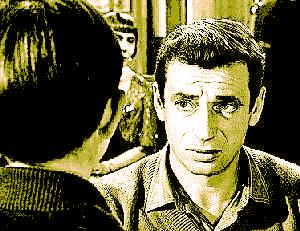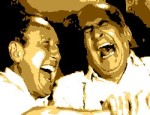Film Review
Premier mai - Le père et
l'enfant (released in Italy as
Festa
di Maggio) is a heart-warming Franco-Italian production which,
with its over-earnest portrayal of working class solidarity, feels like
a throwback to the mid-1930s. It's a film whose class prejudices
are clearly visible (the affluent middle classes are portrayed
throughout with abject contempt), with a young Yves Montand proving to
be as vivid a representation of the noble proletariat as Jean Gabin had
been at the time of the Popular Front. This is one of the lesser
films to be directed by Luis Saslavsky, who had been an influential
filmmaker in his home country of Argentina in the 1930s and 40s before
being forced into exile in France in the 1950s. During his time
in France, Saslavsky directed half a dozen now mostly forgotten films
that include the Cocteau-scripted
La
Couronne noire (1951) and stylish thriller
Les
Louves (1952).
Both stylistically and thematically,
Premier mai looks like a halfway-house between the old-fashioned
cinéma de papa that the
critics of the time had come to revile and the early offerings of the
French New Wave. Extensive location sequences filmed in Paris
have an odd mix of Nouvelle Vague modernity and Italian neo-realism
about them. The characters are authentically drawn and
convincingly played by a likeable cast. As well as an usually
jovial Montand, the cast includes some other talented up-and-coming
actors, in the form of Nicole Berger and Laurent Terzieff. Aldo
Fabrizi, a well-known Italian actor and director of the period, has a
welcome presence as a surly but kind-hearted trunk-driver, but it is
the young Yves Noël who steals the film as the adorable
eight-year-old hero of the piece, François.
The film's high point is a memorable scene in which François
coerces his father (Montand at his most affable and down-to-Earth) into
explaining to him 'where babies come from'. Montand's awkward
attempts to answer the question that every father dreads hearing from
his cherished offspring ("Daddy, how did you make me?") can hardly fail
to strike a chord with any parent. Overall, however, it's a pretty
lacklustre affair, a stuttering social comedy that offers perhaps too
rosy a picture of life at the lower end of the social spectrum.
For every genuine scene such as the one described above there are at
least two which fail to ring true because they paint an implausibly
optimistic view of human nature. For a film made in France in the
late 1950s,
Premier mai is
somewhat dated and saccharine, but that does not mean that it is
without charm. For devotees of Yves Montand, it is an unexpected
delight.
© James Travers 2014
The above content is owned by frenchfilms.org and must not be copied.
Film Synopsis
Jean Meunier, a low-paid electrician, cannot afford for his wife
Thérèse to give birth to their second child in hospital
so it is agreed that she will have a home birth, attended to by her
sister Annie and her mother. With Thérèse about to
go into labour at any moment, Jean is surplus to requirements so he
heads off to a football match with his eight-year-old son
François. On the way, they run into an old friend of
Jean's, Blanchot, who persuades Jean to accompany him to a clandestine
gambling joint. Jean wins a tidy packet at the roulette wheel but
before he can go on his way with his winnings the joint is raided by
the police. In police custody, Jean tells François to head
back home and return with his identity papers. The little boy
arrives home just as his mother is about to give birth and ends up
performing an errand of far greater importance...
© James Travers
The above content is owned by frenchfilms.org and must not be copied.



